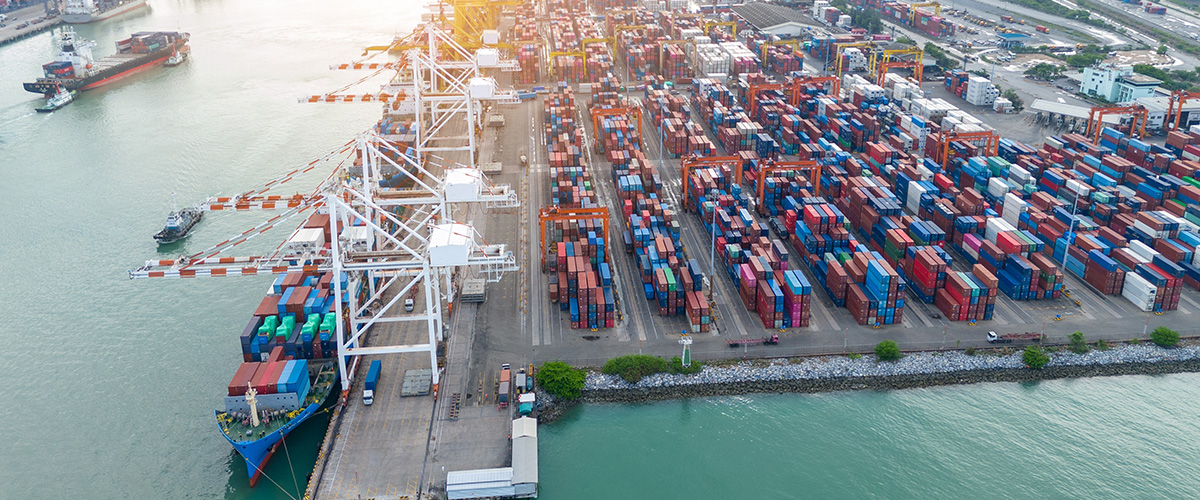North America President, Gordon Cessford sat down with Claire Sandbrook on her podcast Shergroup on the Sofa to discuss Atradius, fraud risk, current events, and the current state of the supply chain.
Gordon will be attending the World Credit Congress event in October of this year, hosted by Claire and Shergroup. You can watch the full podcast episode here. We’ll also dive into some of the topics discussed as well as other relevant conversations here. In today’s interconnected world, staying informed about global events is more than just a good business practice, it’s essential. From infrastructure challenges to geopolitical tensions, the ripple effects of these events can have a significant impact on your business, particularly in terms of supply chains and risk management. Here’s how current events might affect your business and why it’s crucial to stay ahead of the curve.
The Francis Scott Key Bridge Collapse: A Local Event with Broader Implications
The collapse of the Francis Scott Key Bridge in Baltimore might seem like a localized issue, but its effects are far-reaching. Baltimore’s port is a critical hub for numerous industries, from automotive to agricultural goods. As ships are rerouted to other East Coast ports like Norfolk and New Jersey, businesses reliant on the Port of Baltimore may face delays and increased costs. Although these disruptions might not be felt immediately by consumers, the cumulative effect of rerouted shipments can add strain to already pressured global supply chains.
This event coincides with other global shipping challenges, such as restrictions at the Panama Canal due to drought and increased tensions along key maritime routes like the Red Sea. As these issues add up, costs and delays could increase, highlighting the need for strong contingency planning.
Geopolitical Tensions and Their Impact on Global Supply Chains
The ongoing conflict between Israel and Hamas has further destabilized the Middle East, a region critical to the global economy, particularly in terms of oil and microchip production. The war has injected a new level of uncertainty into the oil markets, which could lead to price volatility and supply disruptions. Additionally, Israel’s role as a key player in the microchip industry means that any prolonged conflict could have significant repercussions for global tech supply chains.
Geopolitical tensions, particularly in the Middle East, have a direct impact on global trade. For instance, recent attacks in the Red Sea have driven up shipping costs by over 300%, exacerbating fears of supply chain bottlenecks and inflation. The possibility of the Red Sea route closing could reduce international shipping capacity by as much as 20%, creating significant challenges for businesses that rely on these trade routes.
Get in Touch
Looking For a FREE Quote?
Obtaining a free Trade Credit Insurance quote or just some more information is fast and easy! Get in touch with us today.
Get Started Call 800-822-3223These tensions highlight the need for businesses to stay informed and prepared for potential disruptions. The ability to adapt quickly to changing conditions is crucial in maintaining supply chain resilience and protecting profit margins.
Protecting Your Business Against Global Disruptions
So, how can businesses safeguard themselves against these uncertainties? While there’s no way to predict every twist and turn in global events, there are steps you can take to protect your business. One of the most effective strategies is to invest in trade credit insurance, which can help mitigate the financial risks associated with supply chain disruptions, payment defaults, and fraud.
It’s important to be proactive and prepared. Reassessing your risk management strategies, staying updated on global events, and fostering a culture of awareness within your company are all critical steps to ensuring your business remains resilient in the face of uncertainty.
Increasing Fraud Risks
As global tensions rise, so too does the risk of fraud. International fraud schemes have become increasingly sophisticated, with cybercriminals leveraging everything from phishing emails to complex buyer fraud schemes. The risks vary across regions, with different challenges emerging in the U.S., Europe, and Asia.
For businesses engaged in international trade, it’s essential to reassess your insurance coverage and risk mitigation strategies regularly. Staying vigilant and informed about the latest fraud trends can help you avoid falling victim to these schemes.
Creating a culture of fraud awareness and accountability within your organization is another key element of risk management. This might involve regular training sessions, such as lunch-and-learns led by your Special Investigative Unit (SIU) or conducting internal phishing tests to ensure your employees are aware of potential threats.


